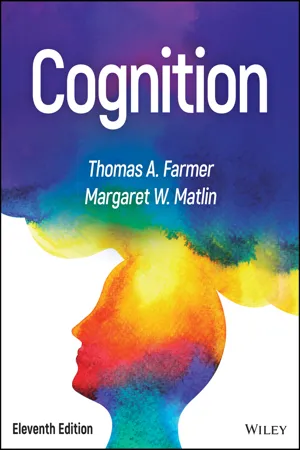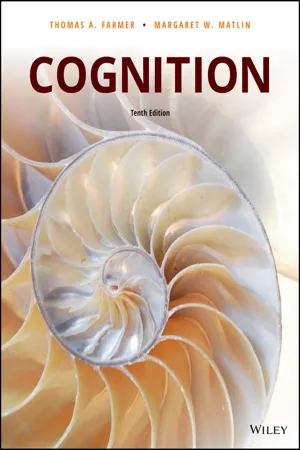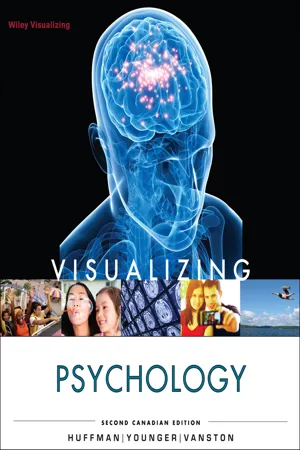Psychology
Developmental Psychology in Memory
Developmental psychology in memory focuses on how memory abilities change and develop across the lifespan, from infancy to old age. It explores how memory processes such as encoding, storage, and retrieval evolve as individuals grow and mature. This area of study also investigates the impact of various factors, such as experience, culture, and biology, on memory development.
Written by Perlego with AI-assistance
Related key terms
1 of 5
9 Key excerpts on "Developmental Psychology in Memory"
- No longer available |Learn more
- (Author)
- 2014(Publication Date)
- The English Press(Publisher)
________________________ WORLD TECHNOLOGIES ________________________ Chapter-1 Developmental Psychology Developmental psychology , also known as human development , is the scientific study of systematic psychological changes that occur in human beings over the course of their life span. Originally concerned with infants and children, the field has expanded to include adolescence, adult development, aging, and the entire life span. This field exa-mines change across a broad range of topics including motor skills and other psycho-physiological processes; cognitive development involving areas such as problem solving, moral understanding, and conceptual understanding; language acquisition; social, personality, and emotional development; and self-concept and identity formation. Developmental psychology includes issues such as the extent to which development occurs through the gradual accumulation of knowledge versus stage-like development, or the extent to which children are born with innate mental structures versus learning through experience. Many researchers are interested in the interaction between personal characteristics, the individual's behavior, and environmental factors including social context, and their impact on development; others take a more narrowly focused approach. Developmental psychology informs several applied fields, including: educational psychology, child psychopathology, and forensic developmental psychology. Develop-mental psychology complements several other basic research fields in psychology including social psychology, cognitive psychology, ecological psychology, and compara-tive psychology. - No longer available |Learn more
- (Author)
- 2014(Publication Date)
- College Publishing House(Publisher)
______________________________ WORLD TECHNOLOGIES ______________________________ Chapter 7 Developmental Psychology Developmental psychology , also known as human development , is the scientific study of systematic psychological changes that occur in human beings over the course of their life span. Originally concerned with infants and children, the field has expanded to include adolescence, adult development, aging, and the entire life span. This field examines change across a broad range of topics including motor skills and other psycho-physiological processes; cognitive development involving areas such as problem solving, moral understanding, and conceptual understanding; language acquisition; social, personality, and emotional development; and self-concept and identity formation. Developmental psychology includes issues such as the extent to which development occurs through the gradual accumulation of knowledge versus stage-like development, or the extent to which children are born with innate mental structures versus learning through experience. Many researchers are interested in the interaction between personal characteristics, the individual's behavior, and environmental factors including social context, and their impact on development; others take a more narrowly focused approach. Developmental psychology informs several applied fields, including: educational psychology, child psychopathology, and forensic developmental psychology. Developmental psychology complements several other basic research fields in psychology including social psychology, cognitive psychology, ecological psychology, and comparative psychology. - eBook - PDF
- Thomas A. Farmer, Margaret W. Matlin(Authors)
- 2023(Publication Date)
- Wiley(Publisher)
263 13 Cognitive Development Throughout the Lifespan Chapter Introduction The Lifespan Development of Memory Memory in Infants Memory in Children Memory in Older Adults The Lifespan Development of Metamemory Metamemory in Children Metamemory in Older Adults The Development of Language Language in Infants Language in Children Chapter Introduction This chapter focuses on cognitive development in three areas: memory, metamemory, and language. Why should we study the cognitive processes of infants and children? One reason is theoretical: This research helps us understand the origins of cognitive skills, as well as the evolution of more complex skills (Gelman & Frazier, 2012; Rovee-Collier & Cuevas, 2009a). Another reason is practical: Many of you will have careers that require background knowledge about infancy and childhood. It’s important to note, how- ever, that development isn’t limited to infants, children, and young adults. In reality, we continue to change and adapt throughout our entire lives (Whitbourne & Whitbourne, 2011). In today’s world, humans are living longer than ever before, and the percentage of older adults has increased dramatically in recent years (U.S. Census Bureau, 2012a). With this shift in population dynamics, cognitive psychologists have started to focus on how cognitive processing abilities change as people enter their older years (often defined in the field of cognitive aging as adults who are 65 or older). Some cognitive skills decline during the aging process, but many other capabilities remain stable. Understanding which cognitive processes change as adults age—along with the factors that drive those changes—can provide information that may directly inform many real-life issues facing aging adult populations. - eBook - PDF
- Richard C. LaBarba(Author)
- 2013(Publication Date)
- Academic Press(Publisher)
In 1885, Ebbinghaus published a monograph on learning and memory experiments that he had performed on himself. These were the first quantified experiments on the higher mental processes of learning and memory. A major twentieth century figure in the mental processes approach to cognition is Jean Piaget. Piaget's developmental psychology is an attempt to trace the development of the operations involved in the growth of thinking, knowledge, and intelligence in children. Piaget's "genetic epistomology" is a major force in modern cognitive psychology. With the formal establishment of cognitive psychology by Neisser (1967), we see a new area of experimental psychology that reflects its historical origins in both structuralism and mental processes, along with new perspectives, methods, and theories derived from computer science, information theory, and linguistics (Reynolds & Flagg, 1977). Although cognitive psychologists continue to emphasize the study of structure over mental processes, the two approaches are now seen as complementary and perhaps inseparable aspects of cognition. Cognitive psychology is now a vast and vigorous area of research, and cognitive psychologists are almost single-minded about the universal importance of cognition in all of psychol- ogy. THE ÈLÂ emory is the fundamental basis for all cognitive devel- DEVELOPMENT OF | I opment and functioning. While it is true that memory MEMORY is studied as a subsystem of general cognition, memory and memory processes are universal attributes of the entire cogni- 272 COGNITIVE DEVELOPMENT tive system. Simply stated, m e m o r y is the retention (storage) and reactivation (retrieval) o f information and events that have b e e n learned or experienced. U n d e r w o o d (1969) defines m e m - ory as the record o f an event which consists of a collection of attributes. - eBook - PDF
- Thomas A. Farmer, Margaret W. Matlin(Authors)
- 2019(Publication Date)
- Wiley(Publisher)
Another reason is practical: Many of you will have careers that require background knowledge about infancy and childhood. It’s important to note, however, that development isn’t limited to infants, children, and young adults. In reality, we never stop developing—that is, we continue to change and adapt throughout our entire lives (Smith & Baltes, 1999; Whitbourne & Whitbourne, 2011). In today’s world, humans are living longer than ever before, and the percentage of older adults has increased dramatically in recent years (U.S. Census Cognitive Development throughout the Lifespan Chapter Introduction The Lifespan Development of Memory Memory in Infants Memory in Children Memory in Elderly People The Lifespan Development of Metamemory Metamemory in Children Metamemory in Elderly People The Development of Language Language in Infants Language in Children COGNITIVE DEVELOPMENT THROUGHOUT THE LIFESPAN 288 Bureau, 2012a). With this shift in population dynamics, cognitive psychologists have started to focus on how cognitive processing abilities change as people enter their older years (often defined in the field of cognitive aging as adults who are 65 or older). Some cognitive skills decline during the aging process, but many other capabilities remain stable. Understanding which cognitive processes change as adults age— along with the factors that drive those changes—can provide information that may directly inform many real-life issues facing aging adult populations. This chapter focuses on cognitive development in three areas: memory, metamemory, and language. I organized this textbook so that the final chapter would encourage you to review many of the major con- cepts from these three important areas within cognitive psychology. As you’ll also learn, infants and young children possess cognitive skills that you might not expect. In addition, you’ll see that elderly people are much more cognitively competent than the popular stereotype suggests (Whitley & Kite, 2010). - Lorelle J. Burton, Drew Westen, Robin M. Kowalski(Authors)
- 2022(Publication Date)
- Wiley(Publisher)
critical period A period of special sensitivity to specific types of learning that shapes the capacity for future development. cross-sectional studies The type of research that compares groups of different-aged participants at a single time to see whether differences exist among them. dementia A disorder marked by global disturbance of higher mental functions. developmental psychology The field that studies the way thought, feeling and behaviour develop throughout the life span. egocentric Being thoroughly embedded in one’s own point of view. equilibration According to Piaget, a balancing of assimilation and accommodation in trying to adapt to the world. explicit memory The conscious recollection of facts and events. fetal alcohol syndrome (FAS) A birth defect caused by alcohol abuse by the mother; FAS babies have facial deformities, restricted intelligence and an agitated personality. formal operational stage Piaget’s fourth stage of cognitive development, which begins at about age 12 to 15, and is characterised by the ability to manipulate abstract as well as concrete objects, events and ideas mentally. implicit memory Memory that cannot be brought to mind consciously but can be expressed in behaviour. infantile amnesia The inability to recall early childhood memories. intelligence The application of cognitive skills and knowledge to learn, solve problems and obtain ends that are valued by an individual or culture. intermodal processing The capacity to associate sensations of an object from different senses, or to match one’s own actions to behaviours that are observed visually. intuition A cognitive process that occurs outside conscious awareness and involves the use of prior knowledge without inference or reason. knowledge base Accumulated information stored in long-term memory. longitudinal study Type of research that follows the same individuals over time.- eBook - PDF
- Karen R. Huffman, Alastair Younger, Claire Vanston(Authors)
- 2013(Publication Date)
- Wiley(Publisher)
9 Lifespan Development I: Physical and Cognitive Development I f you have ever spent time at a daycare centre, you were probably struck by the sight of many exuber- ant children laughing, shrieking, and jostling for atten- tion from those entrusted with their care. Yet amid this barely controlled chaos, babies learn to crawl, toddlers learn not to bite one another, and preschoolers learn their ABCs. Day by day, every child grows a little stron- ger, a little more independent. Over a lifetime, every person undergoes many physical changes. These changes are most striking in early childhood because they happen so rapidly and are so visible. But everyone is in a state of constant change and development throughout his or her entire life. The typical person will be many different people in his or her lifetime—infant, child, teenager, adult, and senior. Would you like to know more about yourself at each of these ages? In the next two chapters, we will explore research in developmental psychology. We will begin this chapter by studying how developmen- tal psychologists conduct their research. Then we will look at changes in our physical and cognitive develop- ment from conception to death. In Chapter 10, we will examine important aspects of our social, moral, and personality development across the lifespan. To empha- size that development is an ongoing, lifelong process, throughout the next two chapters we will trace physical, cognitive, social, moral, and personality development— one at a time—from conception to death. This topical approach will allow us to see how development affects an individual over the entire lifespan. - Michele Hoffnung, Robert J. Hoffnung, Kelvin L. Seifert, Abi Brooker, Sonja Ellis, Damien Riggs, Wayne Warburton, Elyse Warner(Authors)
- 2022(Publication Date)
- Wiley(Publisher)
Additionally, during middle adulthood, crystallised intelligence (which includes learned cognitive processes and abilities such as vocabulary, general information and word fluency) improves with age, while fluid intelligence (the ability to process new information in novel situations) peaks during adolescence and decreases with age. In later adulthood, cognitive mechanics (intellectual problems in which culture-based knowledge and skills such as reading, writing, language comprehension and professional skills are primary) can help people in their seventies maintain and even improve their memory. WHAT DO YOU THINK? To what extent is the cognitive development approach use- ful in working with clients in community services, welfare and counselling situations? Would this theoretical approach be of any use in a science education class, psychology counselling session, primary school education or group therapy session? Why or why not? Moral developmental theories The psychoanalytic, behaviourist, cognitive and information-processing approaches already discussed have influenced our understanding as to how young children develop ideas about morality. Questions such as ‘how do children develop an understanding of right and wrong’?, ‘Why do children behave the way they do?’, ‘How do children learn to be good?’ are explained by these approaches. Moral development is conceptualised as any changes in observed judgements, behaviours and emotions regarding perceived standards of right and wrong that occur in certain contexts across the lifespan. The behaviourist and psychoanalytic approaches to morality emphasise how children acquire standards of ‘good conduct’ from parents, culture, schooling, peer interaction and child-rearing practices. The cognitive-developmental perspective, on the other hand, views children as active thinkers.- eBook - PDF
- Alan Slater, J. Gavin Bremner, Alan Slater, J. Gavin Bremner(Authors)
- 2017(Publication Date)
- BPS Blackwell(Publisher)
Finally, from a biological perspective, it is possible that brain regions implicated in metamemory (in particular the right dorsolateral prefrontal cortex) are not sufficiently developed in younger children. The development of metamemory might depend on several other factors too. For one, exposure to memory tasks may aid in memory knowledge and awareness. Facing the challenges of remembering, children may spontaneously identify successful strategies, come to understand the benefit of applying strategies, and acquire knowledge about selecting the successful strategy in a new situation. However, we lack data to substantiate such a process. Another mechanism proposed to explain the development of metamemory is Vygotsky’s theory of cognitive development, which emphasises the role of social context in cognitive growth (Vygotsky, 1962). In terms of this theory, the development of metamemory is a result of the socialisation process. Children acquire their understanding of memory through the guidance of adults who point out to them the requirements of the task at hand and to the relevant strategy. Thus, Vygotsky’s theory provides motivation for training and intervention studies. The relationship between metamemory and memory performance Although it makes sense to hypothesise that metamemory influences remembering, notably through the application of mnemonic strategies, the empirical data on the connection between metamemory and memory have been mixed. While the relationship between procedural metamemory and memory performance appears weak and unclear (Schneider, 1985), declarative metamemory appears strongly predictive of actual performance (Schneider & Pressley, 2013). As the majority of the studies looking at the relation between memory and metamemory are correlational , we cannot be sure whether memory improvement leads to the development of metamemory skills or whether the acquisition of metamemory spurs memory development.
Index pages curate the most relevant extracts from our library of academic textbooks. They’ve been created using an in-house natural language model (NLM), each adding context and meaning to key research topics.








